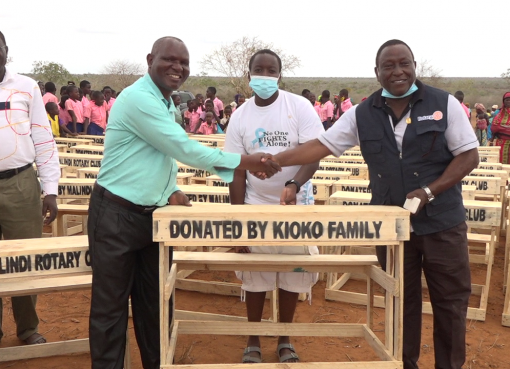Research and deliberate effort put in by the government to address the persistent lack of a stable source of livelihood among pastoralist communities in Marsabit County has started bearing fruits.
In Maikona ward, about 160 kilometers from Marsabit town, an irrigation scheme to help the nomadic communities who majorly depend on livestock for their livelihood in diversifying their economic activity has taken shape with great benefits.
Kalacha irrigation scheme, that was initially started in 1984 to enable the local community grow vegetables, sweet potatoes, sugarcane and fruits for subsistence and little surplus for sale within the then Marsabit district ran into problems because of invasion by monkeys and baboons.
A study by the county department of agriculture, livestock and fisheries realized that availability of water from the Kalacha springs that emanate from Huri hills could support an irrigation scheme to grow animal fodder right in the Chalbi desert belt.
Under the national government project, Drought Resilience and Sustainable Livelihoods Programme (DRSLP) funds were availed to finance the undertaking of an activity that could give a solution to the persistent conflicts over grazing resources among local pastoralist communities.
DRSLP coordinator for Marsabit, Mr Charles Muturi said through capacity building in project, business and group management, 315 members were recruited to start farming grass and other crops for fodder as a deliberate attempt to address the pasture scarcity problem.
Mr Muturi told KNA that the scheme which is located in Marsabit North Sub-county has been scaled up from 20 acres to 200 acres as endeavor is made to readily avail not only enough but quality livestock feed hence easing competition over natural pastures.
The national government through a grant from the African fund Development Bank (AfDB) has funded the rehabilitation of the project at a cost of Sh74 million which now has a direct benefit to 250 households and an indirect value to another 1250 households.
“The funding enabled the formulation of a modern design and management system which has seen transformation of the outline into small-scale community-run irrigation scheme with a lot of success” Mr Muturi said.
The overall objective is to enhance and stabilize pasture production and improve the general food and nutrition security of the target communities as per the government’s policy under the Big 4 agenda.
Kalacha scheme chairman Sora Budha said that the community running the irrigation scheme do not depend on grazing fields as is the case with herders from other parts of Marsabit County because they are able to grow fodder not only for their livestock use but surplus for commercial purposes.
Sale of hay produced from the furrow irrigated scheme has started bearing fruits with the members earning Sh800, 000 from the sale of 1,300 bales produced last year.
Mr Budha said the members harvested 1,800 bales of Rhodes grass for sale but were unable to sell it all after the rains set in providing herders with plenty of pasture.
“We have stored 500 bales that we intend to sell once scarcity sets in,” he said adding that hay is harvested four times in a year.
The scheme also got a boost from a non-governmental organization, Community Initiatives Facilitations and Assistance (CIFA) to improve on the water system layout at a cost of Sh500, 000.
Mr Budha added that the support to the government initiative by CIFA has eased work at the scheme which operates through well supervised sub-committees of fifteen members who can now ably water the entire crop within five days.
But how are the proceeds used? The chairman disclosed that dividends are given to the members to buy food for their families and pay school fees for their children among other needs.
The strong membership, using skills imparted during trainings, has transformed into a cooperative society where they are able to save some of the earnings.
Ms Adho Sharamo, a member of the scheme said that the all-inclusive project has helped transform lives in the area saying poverty has been reduced as the households concerned were now self-reliant with any extreme cases being addressed by other government interventions like the safety net programme and NG-CDF.
Grass species of the Rhodes, Star, Meadow, Buffalo grass do well in the savannah grassland belt.
Ms Sharamo was all praises for the project saying that it had contributed towards poverty reduction among the locals.
“The beneficiaries are able to make a living out of this activity as we get quality and reliable fodder for our animals with increased milk yields and for sale to generate income” she pointed out.
Marsabit North Deputy County Commissioner Stephen Kavulu said that plans are still on course to see how the menace posed by monkeys can be sorted out so that the community could use some of the land to farm food crops.
Mr Kavulu said the government would assist in seeing full diversification of economic activities of the local communities through value addition initiatives like growing Irish potatoes, vegetables, fruits and carrots for improved food security.
The DCC observed that the solution to the poverty afflicting the people as well as conflicts over access to resources that has remained a thorn in the county would be effectively solved by empowering the locals economically through such initiatives.
The journey to this success has however not been without challenges.
Members pointed out a lack of market for the hay produced for commercial purposes during the rainy season as fellow herders prefer natural grazing fields.
The marketing networks are yet to be defined and developed while the members of the cooperative lack proper grass rolling machinery which was cited as a drawback to the realization of the full potential at the scheme.
National DRSLP coordinator Haron Goro said in-depth study in the rangelands had shown that forested hills, mountains and oasis have untapped potential that if harnessed could enormously contribute to the national economy.
“Only 20 per cent of the total irrigation potential in the northern region of this country has so far been tapped” he noted adding that conservation and afforestation would greatly ensure sustainability.
Mr Goro who toured the project two weeks ago said ways were being explored to replicate the idea in other dry lands in the counties inhabited by pastoralist communities.
By Sebastian Miriti




